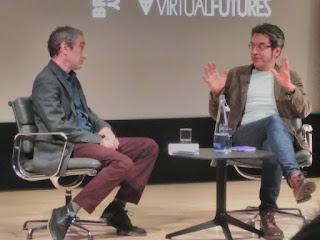Weeknotes: charismatic tech, third space games, responsible data communities of practice

Data is about the past; imagination and experimentation is about the future. -- from Peter Bihr's excellent newsletter, Connection Problem. Starting with tech and innovation, broadly. A great thread (thanks to Alex Howard) about how we think about problems and potential solutions with the Silicon Valley way of doing things, and the limited perspectives of so much of the policy response: How artificial intelligence might change our language . The latest Talking Politics podcast asks "Can we innovate out of the mess we're in, and if so, who is going to pay for it?" - mostly about the green new deal, but also considering tech, innovation funding, and the state of the world in general. It has top Cambridge thinkers joining David Runciman, including Diane Coyle and Bill Janeway. Diane wrote a related post about what we measure and what matters : “Software is frozen organisational and policy discourse” – as we are learning with the burgeoning debate ...

